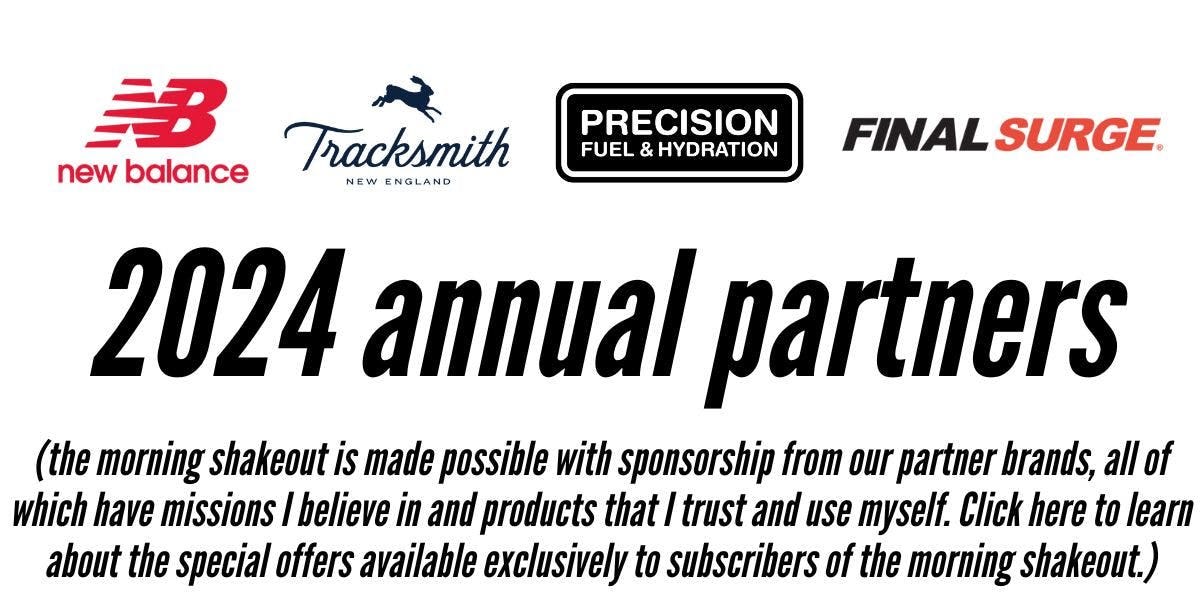the morning shakeout | issue 468
Helping others get better, the sum of who you are, K.I.S.S., and a lot more.

Good morning! I’m heading to New York in a few days for one of my favorite weekends of the year and I hope to see many of you out and about in the city. I’m not hosting any shakeout runs or participating in any live podcasts or panels this year but I will be racing in the Dash to the Finish 5K on Saturday (look for the black singlet with the morning shakeout logo on the chest and tell me to get my ass in gear if you see me run by) and supporting my wife and the handful of athletes I have racing the marathon on Sunday, so please say hello if our paths happen to cross at any point.
Before we dive in, a big thank you to my partners at New Balance for supporting my work this month (and throughout 2024). The recently released Fresh Foam X 1080v14 has been in my stable for a couple weeks now and I am loving it! The 1080 has been my go-to daily trainer for the past 5 years—it’s the shoe that I run 75% if not more of my weekly miles in—and this latest version picks up right where the v13 left off without missing a beat. As the workhorse in my stable, the 1080 is durable enough to handle the daily pounding underneath my feet but lithe and responsive enough to run fast when I feel like it. (FWIW, I did a speed workout in it last Wednesday and it provided some nice pop off the pavement.) The Fresh Foam X 1080v14 is available at your favorite run specialty store or at newbalance.com (men’s sizes here, women’s sizes here).
OK, let’s get right to it.
Quick Splits
— This is an awesome interview with University of Portland men’s cross country and track coach Rob Conner, who’s been coaching at his alma mater for the past 35 years. When you’ve been at something for that long it’s likely that you: 1. Really like what you’re doing; 2. Are really good at it; and/or 3. Making a real impact on people’s lives. Conner checks all of those boxes multiple times over and the team culture that’s been cultivated at Portland has clearly contributed to decades of success on and off the cross-country course. “I tell people in the recruiting process, ‘We want you to come to practice to help other guys get better,’” he explains. “I know that's kind of a strange concept: you're not coming to get you better. The other guys are going to help you get better, but you're helping them get better by being at practice and running the workout in the prescribed manner. If a guy is a little sick, he goes into a different group and does what he can – and that's a very positive opportunity.”
— I’ve been reading Maria Popova’s blog for close to 15 years now. It used to be called Brain Pickings and a few years ago she renamed it The Marginalian. Nearly every day during the week she goes deep on things she’s read or is wrestling with and it’s always interesting, thought-provoking, and insightful. She just celebrated 18 years of writing it with this collection of life learnings acquired over that time and it’s as good an entry point as any into her work. My favorite learning from the list is #18, a reflection on what was a challenging and transformative year in her life. “How you love, how you give, and how you suffer is just about the sum of who you are,” she writes. “Everything in life is a subset of one or a combinatorial function of all three. Seek people who love and give generously, who have the strength to suffer without causing damage. (Only strong people are safe people, the measure of strength being not the absence of vulnerability — and “weakness” is just a judgment term for vulnerability — but the ability to carry one’s vulnerability with such self-awareness and valor so as not to harm other lives.) Seek to be such a person.”
— A little over a year ago one of my athletes, Mary Johnson, introduced me to her friend Jonah Rosner, who used to work at her gym before going on to become a sports scientist in the NFL. He had recently gotten into running as both an athlete and coach and she thought we’d hit it off (spoiler: we did). Over the past 14 months I’ve unofficially mentored Jonah on the coaching side of things and it’s been a lot of fun to watch him learn and grow. During that time he’s unofficially taught me more about sports science than I could have ever cared to learn because he’s a huge nerd with a propensity for generously sharing the latest research in a digestible way. Lucky for those of you reading this, you can learn from Jonah too: he’s one of my favorite people to follow on Instagram (both for the science he shares as well as documenting his own journey as a runner) and his new newsletter, Marathon Science, is the best free resource on training, nutrition, and injury prevention for runners that you can get your eyes on every week. Check out all the back issues and subscribe for yourself right here.
— I enjoyed this Jonathan Gault interview with friend of the shakeout and fan favorite Mark Coogan. The short exchange mostly covered the latest addition to his New Balance Boston squad, six-time NCAA champion and Olympian Parker Valby, and how she’ll fit in with the rest of the team. It also got into how he’ll approach training her, which I found interesting because Mark is known as an “old school guy” and Valby is known for cross-training a lot because she’s been injury-prone in the past. Coogan’s willingness to not change what’s been working for her, while also introducing new elements like altitude training, regular strides, and eventually more running volume, is part of what makes him such a great coach. “I want her to be running most days at least once a day. But there’s more acceptance to cross training now,” he explains. “Part of me thinks that if you’re on the Arc Trainer for an hour in the afternoon and your heart rate’s up there, your body doesn’t know if you’re running or not. It just knows it’s working hard and getting fitter aerobically. I’m sure we’re going to tinker with it, but we’re not going to change anything dramatically the first few weeks she’s here because she’s healthy as anything. She hasn’t been injured [since the spring of 2023]...The key is to be healthy, right? So if you can do something to make sure that you are healthy, it could be changing.”
— Dua Lipa finally made it to the Tiny Desk at NPR and she slayed. (I think it’s better than her at-home edition from 2020, which is the most viewed Tiny Desk concert of all-time.) I was in a pretty crappy mood last Friday afternoon when I went searching for something to listen to and this performance put a smile on my face right away. (It’s probably no coincidence that her latest album is called “Radical Optimism.”) Anyway, this stripped-down set showcases the talent of Dua Lipa and her band, whose sound is usually a bit more produced and polished than what you get from behind the Tiny Desk.
— From the archives (Issue 155, 6 years ago this week): I’d never heard of Jerry Saltz, much less read his work, until a friend recommended this episode of The Longform Podcast to me. And while I still haven’t dug that deep into his work—I’m just not interested in art criticism—I found Saltz’ story fascinating and enjoyed hearing him talk about failing as an artist, getting into writing as a “forty-something year old” long-distance truck driver, his writing process, the role of luck in his career, and a lot more. If you’re an aspiring writer, or want to try and play one on the internet, listen to this conversation he has with Aaron Lammer. “Here’s how to write a statement: Keep it simple, stupid,” he advises. “K.I.S.S. Write how you talk. Write how you think…Just write about what you think you’re doing in the simplest way and I promise you it will be 30 times more interesting than 30 of the next statements you read. It’s the beginning of learning to write, really, and not being intimidated by the process.” (Editor’s note: K.I.S.S. is good advice for running and the rest of life, too!)
— My partners at Final Surge recently released a new feature that allows athletes with Premium accounts to be able to upload photos to their workout comments—and for me to reply back with one, if/when necessary. I’ve been taking advantage of this feature over the past six weeks or so and have found it super helpful when an athlete is trying to describe an injury location, or if they want me to take a look at something form-related, or to simply get something visual across (e.g. what a particular training environment looks like) when words alone won’t suffice. There’s more coming that I’m excited about and will share with you in the next month or two. (More on Athlete Premium here, including how to start a free trial.) Fellow coaches: Head over to finalsurge.com and take advantage of a free 14-day coaching trial today. Use the code MORNINGSHAKEOUT when you check out to take 10% off your first purchase. Any questions? Just reply to this email and send ’em my way!
Workout of the Week: The Recovery Run
In my experience many competitive runners fall into this trap where they’re essentially going medium-hard all the time, i.e. they’re not running easy enough on their recovery runs and/or they’re going too hard on their key workouts, which compromises recovery and adaptation. In the case of recovery runs, the idea is to absorb all the harder work you’re putting in the rest of the week. It’s important to be as intentional with these runs as you are with your most challenging sessions! Remember, you’re not as good as the workouts you do — you are only as good as you recover from the workouts you do. Here are the details.
The bottom line.
”Nothing is less important in life than the score at halftime.”
— The source of this quote is debatable but the sentiment is applicable to so many areas of life. My college coach, Karen Boen, used to tell us that “they don’t hand out blue ribbons at the mile mark,” a reminder that it didn’t matter if you were leading early on if people just kept passing you the rest of the way. You had to run the race from start to finish and that took patience, fitness, and confidence, especially when it looked like you might have been running away with it. On the flipside, if you got off to a slow start and appeared to be (or even felt like you were) out of it, but kept your head in the race, didn’t get discouraged, worked hard, made good decisions, and stayed open to the possibility that things could turn around, well, they just might—and often would. This is as true in running and in sport as it is throughout the rest of life.
That’s it for Issue 468. Please forward this email to a friend, share the web link on social media and/or in your group chats, or reply to me directly at your own risk.
Thanks for reading,
Mario





